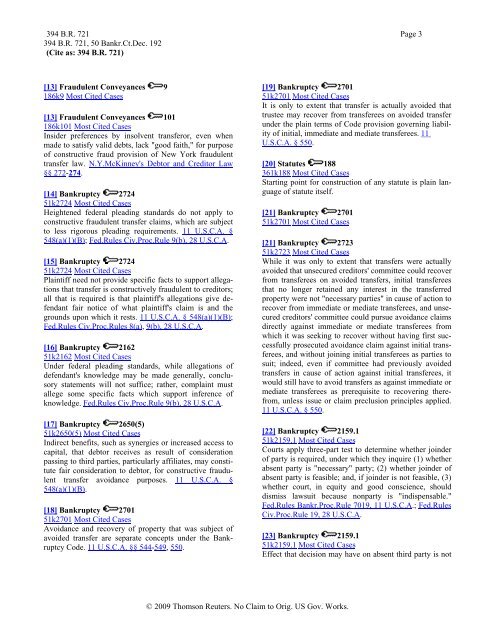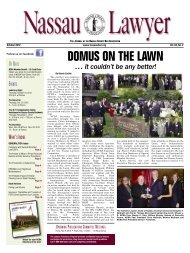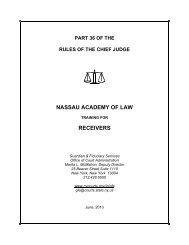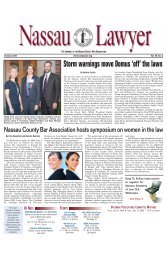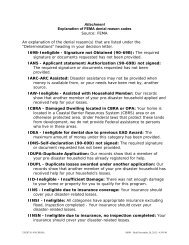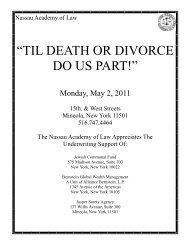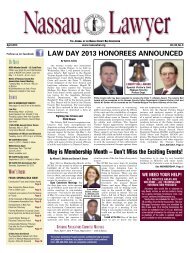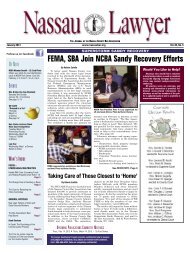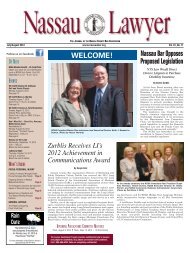394 B.R. 721 Page 2394 B.R. 721, 50 Bankr.Ct.Dec. 192(Cite as: 394 B.R. 721)that renders the exchange with debtor fraudulent. 11U.S.C.A. §§ 544, 548.[3] Bankruptcy 2645.151k2645.1 Most Cited CasesFor initial transferor to have "actual knowledge" <strong>of</strong>scheme that allegedly renders its transaction with thedebtor fraudulent on a collapsed transaction theory, initialtransferor must have been intimately involved in formulationor implementation <strong>of</strong> plan by which proceeds werechanneled to third party. 11 U.S.C.A. §§ 544, 548.[4] Bankruptcy 2645.151k2645.1 Most Cited CasesFor initial transferor to have "constructive knowledge" <strong>of</strong>scheme that allegedly renders its transaction with thedebtor fraudulent on a collapsed transaction theory, initialtransferor must have become aware <strong>of</strong> circumstances thatshould have led it to inquire further into circumstances <strong>of</strong>transaction, but failed to make that inquiry. 11 U.S.C.A.§§ 544, 548.[5] Bankruptcy 2650(3)51k2650(3) Most Cited CasesValid antecedent debt provides adequate consideration tosupport the grant <strong>of</strong> security interest, for fraudulent transferavoidance purposes. 11 U.S.C.A. §§ 544, 548.[6] Bankruptcy 272451k2724 Most Cited CasesComplaint to avoid transfer as intentionally fraudulent tocreditors mustsatisfy heightened pleading requirements <strong>of</strong> Federal Rules<strong>of</strong> Civil Procedure. 11 U.S.C.A. § 548(a)(1)(A);Fed.Rules Civ.Proc.Rule 9(b), 28 U.S.C.A.[7] Bankruptcy 272451k2724 Most Cited CasesParty asserting intentional fraudulent transfer claim mustspecify the property that was allegedly conveyed, the timingand frequency <strong>of</strong> those allegedly fraudulent conveyances,and the consideration paid. 11 U.S.C.A. §548(a)(1)(A); Fed.Rules Civ.Proc.Rule 9(b), 28 U.S.C.A.[8] Bankruptcy 272451k2724 Most Cited CasesAllegations that debtor made an aggregate amount or series<strong>of</strong> cash or other transfers over period <strong>of</strong> time, withoutfurther particularization, are insufficient to state intentionalfraudulent transfer claim. 11 U.S.C.A. §548(a)(1)(A); Fed.Rules Civ.Proc.Rule 9(b), 28 U.S.C.A.[9] Bankruptcy 272451k2724 Most Cited CasesFraudulent transfer avoidance counts in complaint filedby unsecured creditors' committee, to extent grounded onactual, and not just a constructive, fraud theory, lackedparticularity required to satisfy heightened federal pleadingstandard, where committee complained only <strong>of</strong> "net"loss to Chapter 11 estate as result <strong>of</strong> transactions, and didnot identify specific affiliates to which transfers weremade or specific dates <strong>of</strong> those transfers. 11 U.S.C.A. §548(a)(1)(A); Fed.Rules Civ.Proc.Rule 9(b), 28 U.S.C.A.[10] Bankruptcy 272451k2724 Most Cited CasesConstructive fraud counts <strong>of</strong> fraudulent transfer avoidancecomplaint that unsecured creditors' committee had filedagainst Chapter 11 debtors' prepetition lenders on a collapsedtransaction theory, based on debtors' subsequenttransfer <strong>of</strong> loan proceeds to affiliated companies ownedby debtors' principals, sufficiently alleged that loan proceedswere transferred to these affiliates under circumstancesthat constituted a constructive fraud on debtors'creditors, by alleging generally that subsequent transferswere made at time when debtors were insolvent for lessthan reasonably equivalent value; however, committee'sfailure to allege facts supporting inference that lendersknew, or had reason to suspect, that loan proceeds wouldsubsequently be transferred for less than reasonablyequivalent value to affiliates, or that debtors were insolventat time, prevented committee from stating avoidanceclaim against lenders on collapsed transaction theory. 11U.S.C.A. § 548(a)(1)(B).[11] Fraudulent Conveyances 57(3)186k57(3) Most Cited CasesBy its terms, constructive fraudulent transfer provision <strong>of</strong>New York law dealing with transactions that leave debtorwith unreasonably small capital applies only to conveyances,not to obligations. N.Y.McKinney's Debtor andCreditor <strong>Law</strong> § 274.[12] Fraudulent Conveyances 77186k77 Most Cited CasesDelivery <strong>of</strong> collateral to secure a non-avoidable debt orobligation constitutes a transfer supported by "fair consideration,"within meaning <strong>of</strong> constructive fraud provision<strong>of</strong> New York fraudulent transfer law. N.Y.McKinney'sDebtor and Creditor <strong>Law</strong> §§ 272-274.© 2009 Thomson Reuters. No Claim to Orig. US Gov. Works.
394 B.R. 721 Page 3394 B.R. 721, 50 Bankr.Ct.Dec. 192(Cite as: 394 B.R. 721)[13] Fraudulent Conveyances 9186k9 Most Cited Cases[13] Fraudulent Conveyances 101186k101 Most Cited CasesInsider preferences by insolvent transferor, even whenmade to satisfy valid debts, lack "good faith," for purpose<strong>of</strong> constructive fraud provision <strong>of</strong> New York fraudulenttransfer law. N.Y.McKinney's Debtor and Creditor <strong>Law</strong>§§ 272-274.[14] Bankruptcy 272451k2724 Most Cited CasesHeightened federal pleading standards do not apply toconstructive fraudulent transfer claims, which are subjectto less rigorous pleading requirements. 11 U.S.C.A. §548(a)(1)(B); Fed.Rules Civ.Proc.Rule 9(b), 28 U.S.C.A.[15] Bankruptcy 272451k2724 Most Cited CasesPlaintiff need not provide specific facts to support allegationsthat transfer is constructively fraudulent to creditors;all that is required is that plaintiff's allegations give defendantfair notice <strong>of</strong> what plaintiff's claim is and thegrounds upon which it rests. 11 U.S.C.A. § 548(a)(1)(B);Fed.Rules Civ.Proc.Rules 8(a), 9(b), 28 U.S.C.A.[16] Bankruptcy 216251k2162 Most Cited CasesUnder federal pleading standards, while allegations <strong>of</strong>defendant's knowledge may be made generally, conclusorystatements will not suffice; rather, complaint mustallege some specific facts which support inference <strong>of</strong>knowledge. Fed.Rules Civ.Proc.Rule 9(b), 28 U.S.C.A.[17] Bankruptcy 2650(5)51k2650(5) Most Cited CasesIndirect benefits, such as synergies or increased access tocapital, that debtor receives as result <strong>of</strong> considerationpassing to third parties, particularly affiliates, may constitutefair consideration to debtor, for constructive fraudulenttransfer avoidance purposes. 11 U.S.C.A. §548(a)(1)(B).[18] Bankruptcy 270151k2701 Most Cited CasesAvoidance and recovery <strong>of</strong> property that was subject <strong>of</strong>avoided transfer are separate concepts under the BankruptcyCode. 11 U.S.C.A. §§ 544-549, 550.[19] Bankruptcy 270151k2701 Most Cited CasesIt is only to extent that transfer is actually avoided thattrustee may recover from transferees on avoided transferunder the plain terms <strong>of</strong> Code provision governing liability<strong>of</strong> initial, immediate and mediate transferees. 11U.S.C.A. § 550.[20] Statutes 188361k188 Most Cited CasesStarting point for construction <strong>of</strong> any statute is plain language<strong>of</strong> statute itself.[21] Bankruptcy 270151k2701 Most Cited Cases[21] Bankruptcy 272351k2723 Most Cited CasesWhile it was only to extent that transfers were actuallyavoided that unsecured creditors' committee could recoverfrom transferees on avoided transfers, initial transfereesthat no longer retained any interest in the transferredproperty were not "necessary parties" in cause <strong>of</strong> action torecover from immediate or mediate transferees, and unsecuredcreditors' committee could pursue avoidance claimsdirectly against immediate or mediate transferees fromwhich it was seeking to recover without having first successfullyprosecuted avoidance claim against initial transferees,and without joining initial transferees as parties tosuit; indeed, even if committee had previously avoidedtransfers in cause <strong>of</strong> action against initial transferees, itwould still have to avoid transfers as against immediate ormediate transferees as prerequisite to recovering therefrom,unless issue or claim preclusion principles applied.11 U.S.C.A. § 550.[22] Bankruptcy 2159.151k2159.1 Most Cited CasesCourts apply three-part test to determine whether joinder<strong>of</strong> party is required, under which they inquire (1) whetherabsent party is "necessary" party; (2) whether joinder <strong>of</strong>absent party is feasible; and, if joinder is not feasible, (3)whether court, in equity and good conscience, shoulddismiss lawsuit because nonparty is "indispensable."Fed.Rules Bankr.Proc.Rule 7019, 11 U.S.C.A.; Fed.RulesCiv.Proc.Rule 19, 28 U.S.C.A.[23] Bankruptcy 2159.151k2159.1 Most Cited CasesEffect that decision may have on absent third party is not© 2009 Thomson Reuters. No Claim to Orig. US Gov. Works.
- Page 1 and 2:
Nassau Academy of LawCLE Live Class
- Page 3 and 4:
McKinney's Debtor and Creditor Law
- Page 5 and 6:
McKinney's Debtor and Creditor Law
- Page 7 and 8:
McKinney's Debtor and Creditor Law
- Page 9 and 10:
McKinney's Debtor and Creditor Law
- Page 11 and 12:
McKinney's Debtor and Creditor Law
- Page 13 and 14:
McKinney's Debtor and Creditor Law
- Page 15 and 16:
McKinney's Debtor and Creditor Law
- Page 17 and 18:
McKinney's Debtor and Creditor Law
- Page 19 and 20:
BAKER & HOSTETLER LLP45 Rockefeller
- Page 21 and 22: usiness of defendant Bernard L. Mad
- Page 23 and 24: BACKGROUND, THE TRUSTEE, AND STANDI
- Page 25 and 26: Madoff who received fraudulent tran
- Page 27 and 28: ased on fictitious profits and for
- Page 29 and 30: 28. BLMIS funds were also used to p
- Page 31 and 32: Madoff, and her niece, Shana Madoff
- Page 33 and 34: 42. Ruth Madoff was never an employ
- Page 35 and 36: FIRST CAUSE OF ACTIONTURNOVER AND A
- Page 37 and 38: 66. At the time of each of the Two-
- Page 39 and 40: Transfers; (b) directing that the S
- Page 41 and 42: EIGHTH CAUSE OF ACTIONUNDISCOVERED
- Page 43 and 44: TENTH CAUSE OF ACTIONDISALLOWANCE O
- Page 45 and 46: 111. Mrs. Madoff benefited from the
- Page 47 and 48: WHEREFORE, the Trustee respectfully
- Page 49 and 50: 2(c)(3): (a) preserving the Subsequ
- Page 51 and 52: 302 B.R. 760 Page 1302 B.R. 760(Cit
- Page 53 and 54: 302 B.R. 760 Page 3302 B.R. 760(Cit
- Page 55 and 56: 302 B.R. 760 Page 5302 B.R. 760(Cit
- Page 57 and 58: 302 B.R. 760 Page 7302 B.R. 760(Cit
- Page 59 and 60: 302 B.R. 760 Page 9302 B.R. 760(Cit
- Page 61 and 62: 302 B.R. 760 Page 11302 B.R. 760(Ci
- Page 63 and 64: 302 B.R. 760 Page 13302 B.R. 760(Ci
- Page 65 and 66: 302 B.R. 760 Page 15302 B.R. 760(Ci
- Page 67 and 68: 302 B.R. 760 Page 17302 B.R. 760(Ci
- Page 69 and 70: 302 B.R. 760 Page 19302 B.R. 760(Ci
- Page 71: 394 B.R. 721 Page 1394 B.R. 721, 50
- Page 75 and 76: 394 B.R. 721 Page 5394 B.R. 721, 50
- Page 77 and 78: 394 B.R. 721 Page 7394 B.R. 721, 50
- Page 79 and 80: 394 B.R. 721 Page 9394 B.R. 721, 50
- Page 81 and 82: 394 B.R. 721 Page 11394 B.R. 721, 5
- Page 83 and 84: 394 B.R. 721 Page 13394 B.R. 721, 5
- Page 85 and 86: 394 B.R. 721 Page 15394 B.R. 721, 5
- Page 87 and 88: 394 B.R. 721 Page 17394 B.R. 721, 5
- Page 89 and 90: 394 B.R. 721 Page 19394 B.R. 721, 5
- Page 91 and 92: 394 B.R. 721 Page 21394 B.R. 721, 5
- Page 93 and 94: 397 B.R. 642 Page 2397 B.R. 642(Cit
- Page 95 and 96: 397 B.R. 642 Page 4397 B.R. 642(Cit
- Page 97 and 98: 397 B.R. 642 Page 6397 B.R. 642(Cit
- Page 99 and 100: 397 B.R. 642 Page 8397 B.R. 642(Cit
- Page 101 and 102: 397 B.R. 642 Page 10397 B.R. 642(Ci
- Page 103 and 104: 397 B.R. 642 Page 12397 B.R. 642(Ci
- Page 105 and 106: 397 B.R. 642 Page 14397 B.R. 642(Ci
- Page 107 and 108: 443 F.3d 180 Page 2443 F.3d 180(Cit
- Page 109 and 110: 443 F.3d 180 Page 4443 F.3d 180(Cit
- Page 111 and 112: 443 F.3d 180 Page 6443 F.3d 180(Cit
- Page 113 and 114: 443 F.3d 180 Page 8443 F.3d 180(Cit
- Page 115 and 116: 443 F.3d 180 Page 10443 F.3d 180(Ci
- Page 117 and 118: 443 F.3d 180 Page 12443 F.3d 180(Ci
- Page 119 and 120: Page 2257 A.D.2d 526, 684 N.Y.S.2d
- Page 121 and 122: Page 4257 A.D.2d 526, 684 N.Y.S.2d
- Page 123 and 124:
Page 6257 A.D.2d 526, 684 N.Y.S.2d
- Page 125 and 126:
770 N.Y.S.2d 421 Page 22 A.D.3d 780
- Page 127 and 128:
Page 14 A.D.3d 495, 773 N.Y.S.2d 71
- Page 129:
Page 34 A.D.3d 495, 773 N.Y.S.2d 71
- Page 132 and 133:
780 N.Y.S.2d 409 Page 29 A.D.3d 553
- Page 134 and 135:
Page 134 A.D.3d 231, 824 N.Y.S.2d 3
- Page 136 and 137:
Page 334 A.D.3d 231, 824 N.Y.S.2d 3
- Page 138 and 139:
Page 2991 F.2d 31(Cite as: 991 F.2d
- Page 140 and 141:
Page 4991 F.2d 31(Cite as: 991 F.2d
- Page 142 and 143:
Page 6991 F.2d 31(Cite as: 991 F.2d
- Page 144 and 145:
FRAUDULENT TRANFERENCESRonald M. Te
- Page 146 and 147:
Nursing home case_ Transfer of pers
- Page 148 and 149:
Sections 548 and 544 work in concer
- Page 150 and 151:
U.S. Supreme CourtBFP v. Resolution
- Page 152 and 153:
example, from net 15 to COD; or cha
- Page 154 and 155:
Bankruptcy Code Section§ 548. Frau
- Page 156:
Ron Terenzi is a founding partner a


